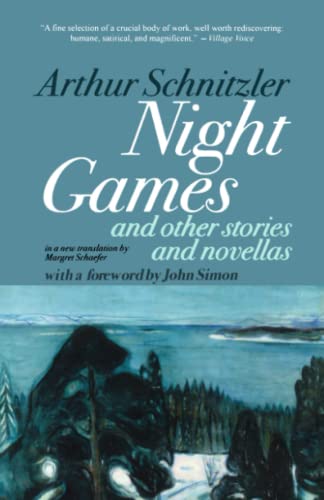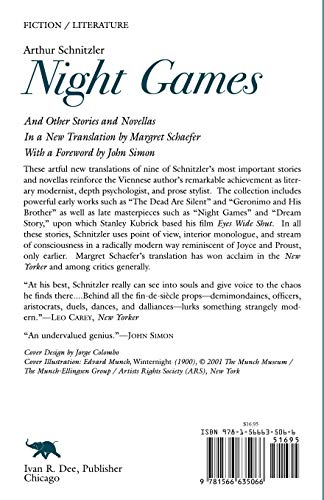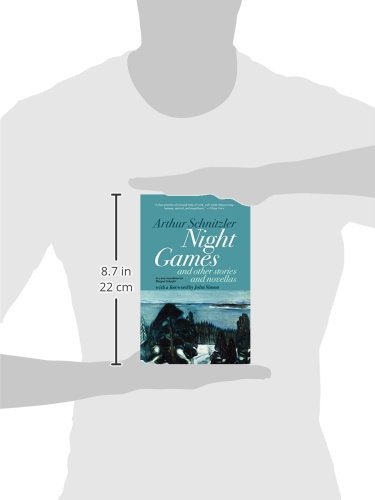Customer Services
Copyright © 2025 Desertcart Holdings Limited




Night Games: And Other Stories and Novellas
C**T
Freudian analysis over a friendly game of poker and other harmless pursuits.
R. Royce stood before the Royal Gorge and saw two protruding peaks; looming in the distance, the Garden of the Gods, as he opened his eyes and remembered fragments of a powerful, poignant dream. Sometimes, he had a difficult time distinguishing myth from legend. Apostle from disciple. "Then came Bronson," Christian biker. He tried to iron out the wrinkles. A boy who fell out of a tree. A friend who lived to tell the story. Something right out of "A Separate Peace." He turned on the television with the remote. "This is how I rip wood stock with a rip saw," explained the carpenter to his rapt, obviously enthralled studio audience. Momentarily shocked into silence, Royce muted the sound. He might just as easily have been a magician sawing a wooden box with his beautiful lady assistant inside in half. He thought about "triple-A." Not the roadside assistance people. Not the military's anti-aircraft artillery unit. Something a colleague once told him long ago: "What every individual needs in order to grow and develop into a fully-functional professional human being is 'achievement, affiliation, and an award.' " He reflected on the Sunday morning cartoons of yesteryear. "Rocky and Bullwinkle." "Mr. Magoo." "Dudley Do-right." "Tudor Turtle," who would inevitably, desperately, and frantically call out "Mr. Wizard! Mr. Wizard! Help me!" Mr. Wizard would chant an alliterative incantation which concluded with the immortal words, "Time for this one to come home." And so, he saved the troubled tortoise from certain disaster. The candle-lit figure of a man appeared, suddenly materializing from out of the shadows. He held out a large, shiny steel, rectangular-shaped meat cleaver. Royce immediately felt threatened and intimidated; then, oddly, he interpreted the finely hand-crafted, wooden-handled object as an offering, a present, if you will; a choice of weapon for dueling. He began to shudder. A duel with the "Grim Reaper." "No thanks," he said. "I have my own." He brandished two flourishing, but obscure instruments, each having enchanting pearl handles. They radiated, shimmered, and gleamed with florescent white light--a stiletto-cross in his right hand, a switch-blade in the left. The next night, Royce was transported to Wrigley Field in Chicago for the seventh and final, deciding game of the World Series. The stadium was filled to capacity with bright, incandescent lights and cheering spectators. "Out!" heard Royce, loudly from some distance away. Then, again, only bellowing in baritone, much closer, and more distinctly this time--"Out! In that instant, he awoke. He considered the ordeal as an omen of banishment. Haunted, perhaps, but he would live to fight another day. Night Games and other Stories and Novella, written by Arthur Schnitzler, who lived from 1862-1931, was translated from the German and published in English in 2002. The collection of stories includes nine selections. Any prominent psychologist of the era must have loved this contemporary author's stories, since he delved so deeply into the mind of his characters. To summarize most succinctly, the stories are about love and death. Upon reading the stories, in which one of the characters abruptly "passes away," you begin to realize that the tragedy may not be so much the death itself, per se, but the life he's led, which may seem kind of ironic. You get the impression that the life he's led was a total lie. All he ever believed in was a total falsehood. He's been shaken to the very core of his being in the instant of revelation. The stories are bizarre, to say the least. To make matters even worse, the character attempts to answer the burning question, "Was it really love, or was I only dreaming?" On the other hand, one could present a valid argument that these stories were actually meant to be more about the suspect values and beliefs harbored by rising middle-class professionals in Austrian society in the early 1900's, than about 'love and death.' To drive the point home, one could continue to argue that the stories take on the complete persona, the personality and psyche of an accomplished, well-known, well-respected physician, who encounters and views with surgical precision the complete spectrum of modern society in the course of his busy existence. Throughout his daily activities, he encompasses the lives of the unfortunate masses (the impoverished, untrained, non-productive, and those exhibiting symptoms of as yet undiagnosed illnesses or infirmities); the laboring worker bees; the self-improving, self-perpetuating middle-class; and the wealthiest upper crust, the seat of power. The story plots are simple and straight-forward. For example, a medical doctor goes out late one night to make a house call at the home of a sick and dying acquaintance. Afterwards, by chance, he sees an old friend. He accompanies him to observe a festive pagan ritual nearby. When he returns home very late and awakens his wife, he learns that she's been dreaming about the very same thing. He decides suddenly and momentously, that he wants to investigate the matter further. In the meanwhile, he dwells on mankind's baser instincts, his most ignoble tendencies, and scandalous behavior in general. The protagonist detective begins to scrutinize the exploitation of human weaknesses. Furiously frustrated, he might more easily have changed careers and become an high-profile media-lawyer or a hostile corporate businessman, than discovering the identity of the mysterious woman he'd met earlier that night. In any case, inspired by Darwinism, he would have profited greatly from the often drastic and catastrophic mistakes of others.
M**F
Excellent Schnitzler sampling
I would prefer to give this collection 4.5 stars, but I believe it is better than a 4, so I give it a 5. Schnitzler, a physician (ENT/Neurologist), was a close acquaintance of Freud, and it has been posited (with substantial merit) that Schnitzler was actually the source of some of Freud's most important proposals. I like Schnitzler's writing style, which very much resembles my own writing style in my first novel, Nicolo's Renaissance, though I had never heard of him when I wrote it. His writing has the flavor of Hesse, but is darker (if that's possible) and less plot driven (also not one of Hesse's strong points). Schnitzler presents his characters using candid and precise streams of consciousness. It's different - and quite revealing. His writing can become a bit laborious at times, with very long yet precise and readable sentences. The reader knows exactly what his characters are thinking. That said, plot is not generally his strong point; furthermore, his stories almost always end poorly for their characters, which can be somewhat of a downer for me.The final offering is his novella, Dream Story, which Stanley Kubrick adapted for his last movie, Eyes Wide Shut, which is one of my favorites. Kubrick hued very closely to Schnitzler's novella, and it is amazing how well Schnitzler's fin-de-siecle Vienna translated into early 21st century New York. This was my favorite part of the collection, and I think if readers were to have only one exposure to Schnitzler, a worthwhile endeavor, Dream Story would be the one to read.
S**U
Schnitzler Surprised Me
Schnitzler surprised me. I expected-- to be honest, this purchase was to see how the author measured up to Kubrick-- to read Eyes Wide Shut, which I did, nearly line for line. But there is much more to this author's work that that story (perhaps the best if only for its oddity.) At his best, he is as good a tragedian as Shakespeare is at his worst. (Which is not to suggest that Shakespeare is or ever has been bad-- but in relation to his own work, there must be best and worst... That is a compliment to Mr. Schnitzler, not an insult to Wm. S.!) There are some times, in some of the shorter stories, that the translation seems to lose something of the original, not an unusual complaint, I suppose, but one which is especially pronounced here. Not able myself to read the original, call it intuition. Some of the stream of consciousness, for example, is almost too leading, too closed when it comes to meaning. But the relationships between people are profoundly real. Mostly, it is an enjoyable collection.
H**L
Stories From the Sexual Unconscious.
Amazing works of the stream of conciousness of the human mind. You may find yourself in them. Freud himself learned from them.
J**P
2-star Kindle Version
This is not a comment on the book itself, just the Kindle version: it's one of those scanned adaptations, that's harder to read (particularly on e-ink devices) and which disallows changing the font. Amazon should really note which books were converted using this clumsy method, so that customers would be aware before buying.
L**R
A Touch of Pre-WW II Austrian Fiction
A flashback to pre-WW II Austrian fiction. This is definitely a worth while book to read and enjoy.
T**R
Five Stars
great stories
C**S
Worthwhile
Clearly Schnitzler is greatly neglected, at least in the U.S. He has some predictability and perhaps a slow pace compared with contemporary writers, but does have much to say. His fin de siecle writing is clearly influenced by the Viennese focus, if not fixation with what Freud called the Unconscious.There is also much that deals with infidelity and sexual liaisons, presented in what is a rather sedate manner of the time.I do not doubt that Schnitzler might have well 'spiced up' his text in a current writing, but had bowed to the mores of the time.The works are enjoyable, though not clearly the taste that will appeal to all palates.
T**N
A book produced by people who don’t care about books
Beware. Though this is listed as an Ivan R Dee edition my order was fulfilled with a very nasty Amazon print-on-demand copy - horrible paper, poorly bound, typeset by a (blind) robot and fuzzily printed. And all for only about 50% more than the usual cost of a literary fiction paperback! I am returning it.
M**G
and of course Dream Story (inspiration for Kubrick's Eyes Wide Shut) are particularly good.
Lovely book. Some very interesting stories, Title story, Night Games, and of course Dream Story (inspiration for Kubrick's Eyes Wide Shut) are particularly good.
R**D
Excellent
Excellent
M**S
What took me so long to discover this writer!?
When preparing foreign trips, I always try to find a fiction work that deals with the area I will be visiting, and so I discovered Schnitzler, to my great pleasure. I will not write a book review here, but will suffice to freely quote the introduction where we are told that Freud, who knew Schnitzler personally, had written to him saying that he (Schnizler) knew as much about the human character as he (Freud) did. And so the book reads, with twists and turns and surprise endings.
P**T
Five Stars
masterpiece
Trustpilot
2 weeks ago
2 weeks ago